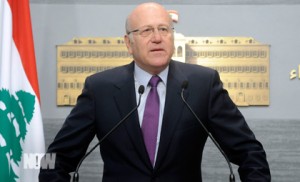 Lebanese Prime Minister Najib Mikati denied on Saturday that Syria interfered in his decision to pay Lebanon’s share of funds to the Special Tribunal for Lebanon (STL).
Lebanese Prime Minister Najib Mikati denied on Saturday that Syria interfered in his decision to pay Lebanon’s share of funds to the Special Tribunal for Lebanon (STL).
“In the beginning, there were statements that my cabinet was made by Hezbollah. Now, there are statements that Syria interfered in my position on the STL. I swear that no one interfered in the issue of the STL ,” Mikati told Al-Jazeera TV
He also voiced hope that the tribunal, which was established “to reveal the truth” behind the murder of Hariri, is not politicized, adding that his decision to pay the funds to the tribunal was coordinated with Speaker Nabih Berri and President Michel Suleiman.
“I cannot overlook any crime, especially if it is committed against a former premier. I will not be an obstacle in the face of justice, but at the same time, I am against politicizing the tribunal.”
Mikati added that he was “clear” about his position against politicizing the tribunal during his meeting with STL President Judge Sir David Baragwanath, who visited Lebanon in November.
Asked about the witnesses who allegedly gave false testimonies to the commission probing the Hariri murder, Mikati said the issue should be taken into consideration but that he cannot make a judgment now on the false witnesses’ file.
He added that the false witnesses issue will be addressed at the “appropriate time.”
In November, Mikati announced the transfer of funds to the UN-backed court probing the 2005 assassination of former PM Rafik Hariri.
The Special Tribunal for Lebanon was created by the United Nations Security Council in 2007 , at the request of the Government of Lebanon to investigate the 2005 assassination of former Prime Minister Rafik Hariri.
On January 12, 2011 Hezbollah and allies with the help of the Shiite minister that represented president Michel Suleiman in the cabinet overthrew the government of former PM Saad Hariri over the Special Tribunal for Lebanon’s imminent indictment.
STL issued the indictments and arrest warrants on June 30. Two of the suspects Mustafa Badreddine and Salim Ayyash are reportedly senior members of Hezbollah and played leading roles in the assassination while the other two Hezbollah members Hassan Aneissy, also known as Hassan Issa, and Assad Sabra played a supporting role in the execution of the assassination.
“No Lebanese government will be able to carry out any arrests whether in 30 days, 30 years or even 300 years.” Nasrallah said following the announcement of the indictments.
Syria
Commenting on the Syrian situation and recent sanctions imposed on it by the Arab League, the premier said Lebanon’s situation is “critical,” adding that Lebanon is dissociating itself when it comes to decisions on Syria for the “sake of national interest.”
“We are concerned about Arab consensus, and we are sure that the Arab countries understand Lebanon’s stance.”
Mikati added that he wants to prevent the Syrian situation from having repercussions on Lebanese society.
“We are trying to avoid [being in a position] where we have to stand with Syria or against it.”
In November, the Arab League voted sweeping sanctions against Damascus to punish the regime for failing to halt its deadly crackdown on anti-government protests – the first time the bloc enforced sanctions of this magnitude on one of its members.
Nineteen Arab League members voted for the sanctions. Iraq abstained and said it would refuse to implement sanctions, while Lebanon ‘disassociated’ itself.

Leave a Reply
You must be logged in to post a comment.